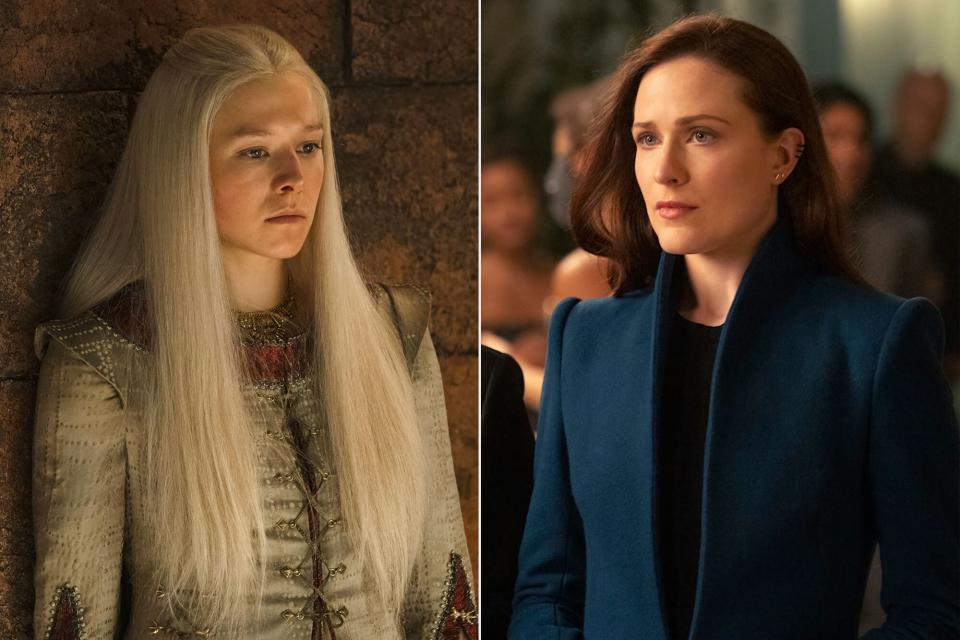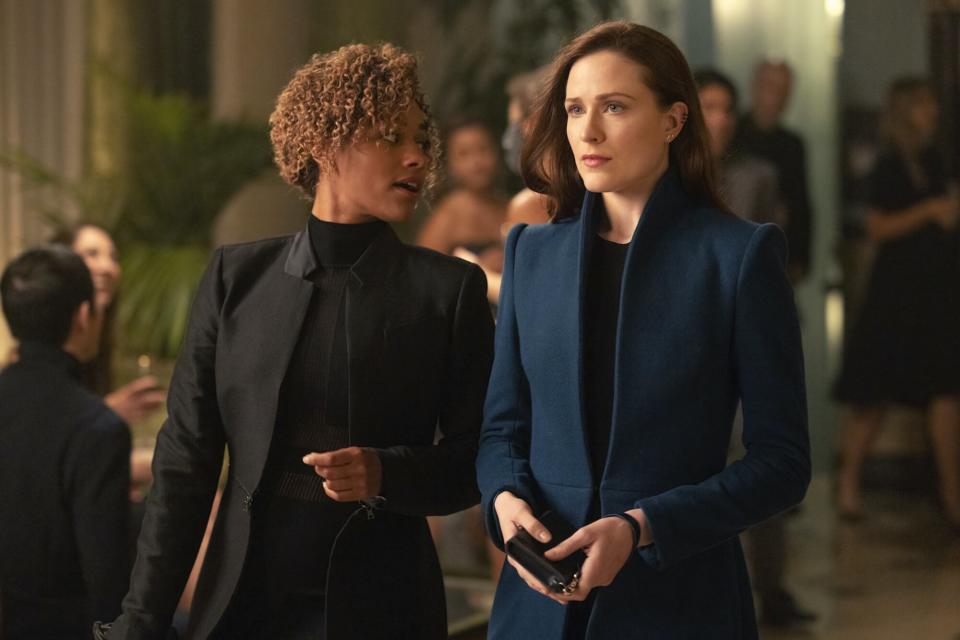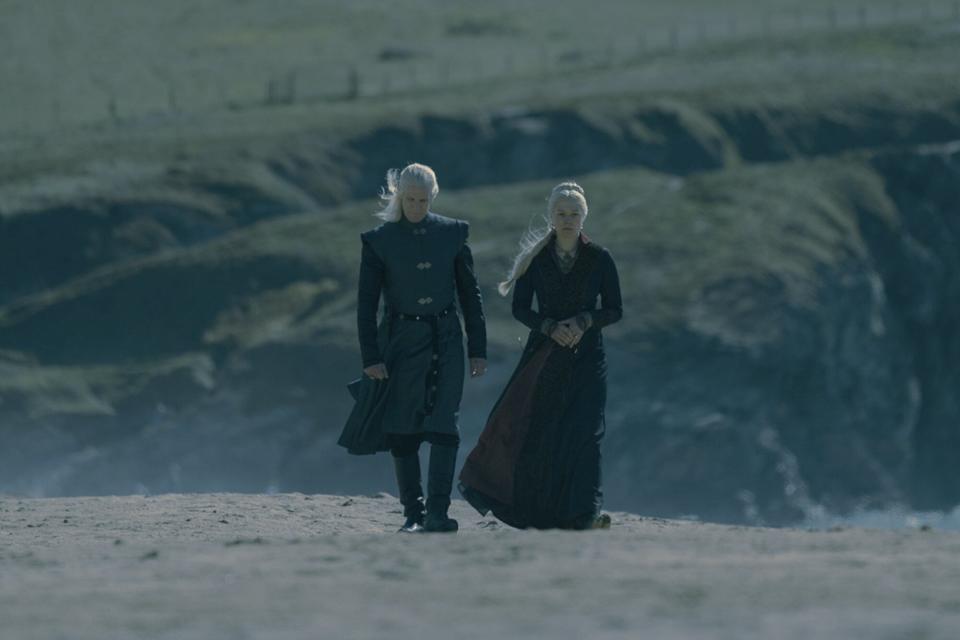Ramin Djawadi on the musical Easter eggs of Westworld season 4 and new House of the Dragon score
Warning: This interview contains spoilers from Westworld season 4.
Ramin Djawadi is booked and busy. After composing the score and orchestral covers for the fourth season of HBO's Westworld, which premiered its latest finale this past Sunday, the Iranian-German composer once again found himself deep in the heart of Westeros, creating the sounds for Game of Thrones prequel series House of the Dragon. He was the man to do it, having scored the now-famous orchestral melodies for the original series.
"I was on the original [Thrones] series for eight or nine years. It's very close to my heart," Djawadi tells EW. "I was very excited to hear that this is coming back and for the opportunity to just write even more music for this."
Djawadi speaks with EW about the musical Easter eggs you might've missed in Westworld season 4 — from the Frank Ocean and Nine Inch Nails covers to a re-arrangement of the main Westworld theme — and returning to Westeros for House of the Dragon.

Ollie Upton/HBO; John Johnson/HBO Composer Ramin Djawadi discusses the sounds of 'House of the Dragon' and 'Westworld.'
ENTERTAINMENT WEEKLY: With this season of Westworld in particular, the idea of sound played a very active role within the storytelling itself, to the point where Hale was using it to manipulate all of the humans that she enslaved. Do you feel that the score itself had a deeper connection to the story this season?
RAMIN DJAWADI: That's a great point actually. I think this season is a perfect example of how well sound and music score can work together. From the very beginning, while they were still shooting, we started talking about, what is that control theme and that sound? So it gets reflected in the score, this three-note motif that you hear a lot on the very high strings, and then it translates all the way into the sound design of this shattering sound. And then throughout the show, I would always get updated sound effects tracks, so I always knew when to hold back with the score, when the sound effects would be upfront, and vice versa.
One of the most fun musical aspects of Westworld is all of the orchestral covers of popular songs that you incorporate into this. At this point, you've done so many. Have you developed a tried and true method of how you approach these specific covers start to finish?
Yes and no. What's fun about the show is, we use them at different moments. Sometimes it's very much part of a score, meaning some of an action scene or something where I actually have to score a little bit to picture it. Sometimes it is more of a montage, so then the song plays out pretty straight as the original. It always depends on where the scene is, and same with the instrumentation. There's such a variety of settings with the future stuff [and] the Westworld stuff. There's so many different aspects to it, instrumentation-wise, that guides me. And at the core, of course, is the piano, because that's how it all started.
Do you get to choose all of the covers that are incorporated into the show?
I don't choose them. That's left up to the showrunners. We also have a music supervisor on board that makes suggestions. When I come in, they usually already have picked the piece, but we seem to have the same musical taste because every song that we do, I'm always super excited about and love.
Let's talk about some of these big musical moments that we've had over the course of season 4. The first one I immediately put down in my notes was in episode 1 with the Lana Del Rey "Video Games" cover. That happens as Teddy is looking up at Christina and the end credits start to roll. As you were reading about that moment in the script — and I don't know if it's written into the script itself where it's like, "Insert Lana Del Ray 'Video Games' cover" — what were your big takeaways from that moment?
So, first of all, many times I don't read the script. I just come in when the show is shot. So, I'm not sure if it was particularly written into the script. But just the way the episode was set up, it felt right to have a big musical moment at the end. It gets so epic when we see Teddy again, and she's on the balcony. The big thing was the emotion of the two of them and the history they have. It just felt right to have a song like that instead of score.
Another one is Metallica's "Enter Sandman." This happens in the Jazz Age amusement park and it's in that very familiar loop of the robbery where we always get "Paint It Black," but this time it wasn't "Paint It Black." I'm curious what the decision there was for changing things up a little bit.
It's exactly what you're saying. The idea was to change things up, because we felt we have done this twice. "Paint It Black" would've been the obvious choice, and it would've been fun to do a jazzier version of it, but then we thought, "Well, this is now what people probably expect." Westworld, as you know, is always known for surprises, so we thought, "Let's actually do something that people didn't expect and wouldn't expect." So we thought, "Let's just pick another classic, epic song." We landed on "Enter Sandman," and also, clearly, didn't go fully jazz. There's some little moments in there that hint to that a little bit, but a lot of it is also still very much rock and roll with orchestra.
Either with this cover specifically, or generally speaking with season 4, did you use a lot of different instrumentations compared to the last few seasons?
Yeah. We've always had a great hybrid, and I always felt like that was such a creative and fun way to approach the score with season 1, where we had obviously the Westworld elements, and we did acoustic guitars and all the organic elements. And then, whenever we would be under the park with all the techy stuff, robots, and futuristic things, we always had to use the synthesizers. But, especially in season 3 when it pushed into this future world, it became very synthetic. Same with the songs and in the score itself, sometimes we use more synth. In season 4 now, we brought some of that also with the outliers, that there were a lot more organic elements that came back into play.

John Johnson/HBO The roomies head to a restaurant, where Christina (Evan Rachel Wood) will go on a not-so-great blind date in 'Westworld' season 4.
You had two really subtle orchestral covers in season 4 that stood out to me. One was Frank Ocean's "Pink + White," which I clocked was playing at the piano as Christina was walking into the bar and meets Maya. Another one was Nine Inch Nails, "The Day the World Went Away," and that was during Christina's awkward luncheon with Hale. Do you approach those the same? They were very subtle. People may not have even picked up on them if you didn't point them out.
It's interesting that you caught those and point them out. This is just the variety of what we tried to do with Westworld where we have these smaller scenes where we thought, "Oh, instead of using something else, let's actually also do a song." And then, yes, I do approach them different, because, like the Frank Ocean, that's literally just a single musician. A player could be playing the piano at the restaurant. So I have to treat it very much like that. It has to be a solo piece in the background. It's a lot harder to catch, but that's the fun of it. You have to look out for them.
What is your ethos about what makes the best kind of needle drops, like a lot of these in Westworld?
I guess it's the variety of songs that get picked and the deeper meaning of how people might interpret them, the memories that might get associated with them. "Video Games," for example, there's the fact that that's the history that Christina and Teddy have, or Dolores and Teddy have. So then it's about memories. There is always a meaning to the song. "Enter Sandman," I grew up with that song. I'm a huge Metallica fan. And so, it was a blast to do that with the orchestra, and very much do that in that rock and roll way and see how the orchestra can play that.
I'm not a hundred percent sure this was a cover, but it seemed to be a cover of your own Westworld theme. It seemed like a slightly different arrangement. I clocked it in the show towards the end as Hale is burning up all of her experiments with all the host Calebs, and the episode cuts to the end credits. I wasn't sure if that was intentional in that moment.
A hundred percent. Very glad you're pointing that out, because it also is kind of montage-y. This could have been a perfect spot for a song, but yet again, we decided, "Well, instead of doing a song, let's actually use a theme from our score." And I thought, "Well, we haven't used the main title theme that much." And we tend to use the main title theme towards the end of the season always. And then, given the setting and the more synth sound, I thought, "Let's just use the main title theme and play that even darker and more aggressive." That's why we have the drums and there's guitars. It's a lot more edgy than the actual main title.
Do you have a favorite musical moment this season where you felt it was really, in however subtle a way, hinting to viewers that some big twist was coming?
I can think of two things, actually. One is Caleb's daughter, the grown up version. Her theme gets established very early on. We did not want to give it away that we then get to meet [C] later. So the theme was very sparsely used, but then in the later episodes, when Caleb sends the message on the rooftop and then during the goodbye, that's when the theme actually fully plays out. I really enjoyed developing that. And then, the other one is also the Christina theme, which is a new theme this season we hear when she walks to work, and then it gets used with her every time. When she figures out that she's a writer, that she can control people with her stories, and how that also pays off in a very emotional way at the very end with Teddy on the balcony, it starts out more synthetic, and then becomes more orchestral and emotional towards the end.
The other specific cover I wanted to ask you about comes at the very end of the series: "Pyramid Song" by Radiohead. How many times has Westworld covered Radiohead? I lost track after five.
Actually, me too. I don't know. But I definitely know that Radiohead is on the top of the list. I think we have covered their songs the most. And why that is? Number 1, we're huge fans of the band. Everybody on the Westworld team loves Radiohead. And probably also, their songs, mood-wise, is something that's very fitting for a show like this. It's just great music.
What do you feel makes "Pyramid Song" a great cover as a final note to Hale's storyline and to this season?
There might be even more specific reasons of why this song was chosen, but one very simple reason was that we felt like we had gone through the whole season and had not had a Radiohead song yet.
It can't be Westworld without a Radiohead cover.
That's right, yeah.

Ollie Upton/HBO Prince Daemon Targaryen (Matt Smith) walks with Princess Rhaenyra Targaryen (Emma D'Arcy) in HBO's 'House of the Dragon.'
Let's pivot to House of the Dragon, which is coming up this weekend. The first episode that I saw at the LA premiere didn't have a full opening credits sequence that we typically get of Game of Thrones. The main theme music, is that similar to what we've heard in Game of Thrones?
I don't know if I really can comment on this yet at this point, to be honest. I think that we unfortunately have to wait with that a little bit.
Do you have a general idea of when people will finally get to hear the main theme music?
I can say this much, we very much wanted to keep the DNA alive for House of the Dragon from the original show. We will hear themes that we remember from the original show, but because it's all new characters, this is 200 years before, there is a ton of new material I've written, a lot of new themes that we will hear.
What was your starting point for House of the Dragon? Was it similar to Westworld in that you didn't really have a script and you were coming in as production was starting?
There's some material that I did write before, because there's some on-camera things, and some things that required having the music available earlier, during principal photography. I read the script [later]. I did not read the script months in advance, but then I did get the script because I was just getting too curious and I thought, "I have to take a look at this." I read it, and then shortly after HBO wrapped shooting, and then I got the episodes.
What were the biggest elements in doing your research on House of the Dragon that you immediately knew you wanted to incorporate in some way into the score?
This is all about the Targaryens, so the big thing was to keep their sound and their themes. Like I said earlier, the DNA, it needs to be connected. That was a foundation. But because we're dealing with House specific, I wanted to make sure that there's a lot of new themes for different characters and all the complex storylines that we know happens in Game of Thrones. I wanted to connect the two like that.
Is it fair to say that material that you used for Emilia Clarke's Daenerys in Game of Thrones played a factor in developing the Targaryen sound that you're talking about?
Yes. Definitely the sound that Daenerys had is tied to the Targaryens. The sound is the same. However, I think it's important to point out that, actually, Daenerys has a separate theme than the Dragon theme. So, they're the two separate themes, but sonically, they're similar.
Were there specific instruments you were really excited to use for House of the Dragon?
What was important to me was to keep the general sound alive. The big sound of Game of Thrones, the primary instrument was always the cello, and we will definitely hear the cello again in the show. Just the way I stylistically write the show, I hope people will hear it and go, "Okay, I feel familiar. We're back in Westeros." That was always the idea.
Did you have any big influence for the score beyond the world of Game of Thrones and what you did on that original show?
No, not really. The big difference is that we have new showrunners. It's not David Benioff and Dan Weiss, it's Miguel Sapochnik and Ryan Condal. They might have a different vision. We worked very closely together. They are a part of my inspiration of where the score is heading.
House of the Dragon premieres this Sunday on HBO and HBO Max.
Subscribe to EW's West of Westeros podcast, which goes behind the making of House of the Dragon and the growing Game of Thrones universe. The podcast launches Aug. 21.
Related content:

 Yahoo Movies
Yahoo Movies 
